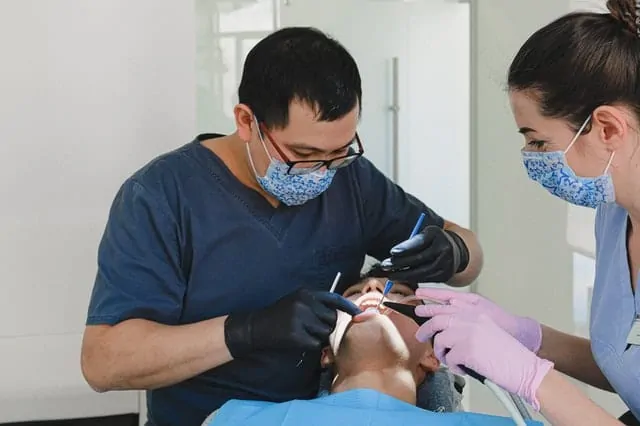Nutrition & Oral Health

Even though your dentist in Douglasville is all about keeping your mouth healthy, the truth is, proper nutrition and good oral health go hand-in-hand. This is why, during this National Nutrition Month, we want to do our part to raise awareness of the importance of eating right.
On A Nutrition Mission
When it comes to nutrition and eating healthy, it can seem simple from the surface — don’t eat too much sugar, eat your vegetables, limit fast foods. But when taking a deeper look into what the experts recommend, it can get pretty complicated. After all, even the United States Department of Agriculture (USDA) changed their recommendations twice since the Food Guide Pyramid was created in 1992. But healthcare professionals across the country, from dietitians to your dentist in Douglasville, are on a mission to make nutrition easier to understand.
The truth is, not all of us need the same things in the same quantities. Like many things, nutrition is individualized and is based on a number of factors such as age, gender, height, weight, activity level, and underlying health concerns. The best way to find out your nutritional needs is to go to MyPlate and customize the best mix of dietary recommendations for you.
Eat Well, Smile Happy
We all know that what we eat can affect our overall health and either increase or decrease our risk for certain diseases and health concerns. But your dentist in Douglasville wants you to know that what you eat also affects your oral health. In fact, many of the types of foods that can negatively affect our overall health can do the same for our teeth and include:
- Sugary Sweets
- Carbohydrates
- Fatty Foods
- Acidic Drinks
Foods or drinks that contain a lot of sugar, are high in carbs or fats, and foods and drinks that are acidic can damage tooth enamel and leave teeth exposed and at risk for decay.
The Hidden Sugar Effect
Many patients know that your dentist in Douglasville will caution people about the risks of sugary foods. However, a lot of us aren’t aware of why your dentist may also tell you to take it easy on the carbs. Even though high-carb foods don’t taste sweet, they have something called “the hidden sugar effect” which breaks carbs down into simple sugars and can affect your teeth in a similar way as sugar-packed sweets.
Foods For Teeth
When you’re planning your meals and snacks based on your MyPlate results, don’t forget to choose some foods that can help keep your teeth strong and decay-free. Some foods for teeth include:
- Dairy products such as cheese, milk, and yogurt
- Crunchy vegetables like carrots and celery
- Lean meats and fatty fish
- Water
During this National Nutrition Month, find your ideal balance of the major food groups and try to fit your individual recommendations in each and every day. Eating a well-balanced diet can go a long way in helping your body, and your mouth, stay healthy.
How Do I Know If Tooth Pain Is Serious?

Any type of ongoing tooth pain usually means something isn’t quite right. But does that mean every toothache requires a visit to your dentist in Douglasville? The short answer — probably. However, if your pain lasts for 2 or more days, isn’t reduced with painkillers, and is paired with swelling or a bad taste in your mouth, you need to get to a dentist.
Understanding Different Types of Tooth Pain
Different types of tooth pain could indicate different types of problems, and it’s important to know what various feelings could mean. Being able to explain your pain to your dentist in Douglasville can help find the underlying cause and get you treated and out of pain quickly. The following pain descriptors are to be used for informational purposes only and should not be used to diagnose any problem. Always see your dentist.
Dull, Chronic Ache
A constant, dull ache is the most common type of toothache and could be a sign of anything from a piece of food lodged in your gums or between your teeth to an abscess. This type of pain can also be a sign of tooth grinding. If not treated, grinding your teeth can lead to broken or chipped teeth and TMJ disorder. You may be able to get relief by gently flossing your teeth to remove a leftover food particle, but if that doesn’t work you should see your dentist for a more thorough evaluation.
Hot/Cold Sensitivity
A lot of people have sensitive teeth, and sometimes it’s managed well by using the right toothpaste and regular cleanings. But extreme sensitivity to hot or cold things may also be a sign of something more serious. Tooth sensitivity that doesn’t go away after about 30 seconds could indicate gum disease, tooth decay, worn enamel, or fractured teeth.
Thumping, Throbbing
Constant throbbing tooth pain can be a major distraction and keep you from doing other things such as working productively and sleeping. If it doesn’t go away it may be a sign of a cracked tooth, dying nerve, abscess or other infection, or an oral lesion. Call your dentist to find out and get relief.
Sharp Pain
A sharp, stabbing pain always requires a visit to your dentist and will most likely require some sort of restorative dentistry treatment. Sharp pain could mean you have a cavity, a cracked or broken tooth, or you have an old dental restoration such as a crown or filling that needs attention.
As we mentioned before, any type of tooth pain typically means something isn’t right and you should see your dentist in Douglasville for an exam, diagnosis, and treatment plan sooner rather than later.
Pandemic Stress & Oral Health Problems

As we head into the one-year mark of this pandemic, there are still several unknowns. But one thing has remained constant the whole time — stress levels are high, and rightfully so. Stress isn’t the best thing for health, especially at times like these. Prolonged periods of high stress can put us at increased risk for heart disease, actually make our immune systems less effective, and cause some unwanted gut problems. That’s not all. Dentists have also noticed an increase in oral health problems the past year, including this dentist featured in the New York Times. In today’s blog, your dentist in Douglasville explores some ways how stress can affect your oral health.
Chipped or Broken Teeth
You know how your body reacts kind of automatically when you’re stressed out? Maybe you start to sweat even though you’re not hot. Or perhaps your heart starts beating so fast it’s all you can hear. These and other subconscious reactions happen, and they’re not always so obvious. In fact, sometimes we don’t even notice that our body reacted at all. One great example of this is when we grind or clench our teeth. Many times we’re not even aware that we’re doing it, but it can certainly cause trouble. The constant pressure of teeth on teeth during clenching or grinding can cause tooth damage such as chips, cracks, or breaks and will require treatment from your dentist in Douglasville.
Jaw Pain
Unfortunately, the problems with clenching and grinding don’t end with damaged teeth. These repeated motions over and over again can start to cause jaw pain as the muscles in the jaw joint are overworked. If this happens over a long period of time, this can develop into TMJ disorder, and the pain can become severe and lead to other problems such as headaches, neck pain, and difficulty chewing.
Gum Disease
Now, besides the problems associated with clenching and grinding, there’s also the risk of gum disease. Gum disease is an infection in the gum tissue and is usually caused by poor dental hygiene or tobacco use. However, stress may also increase the risk of developing gum disease. Your dentist in Douglasville can treat gum disease if it’s caught early, but if the disease becomes more severe it also becomes irreversible. Untreated advanced gum disease can cause tooth loss and increase the risk of heart disease, kidney disease, and some cancers.
Canker Sores
It’s important to note that scientists have yet to determine one absolute cause of canker sores. But research conducted by the Academy of General Dentistry suggests a possible correlation between high levels of stress and the development of canker sores. Even though these painful bumps may be a little bit painful and a lot bit annoying, they’re not contagious or dangerous and should go away on their own.
Lower Your Stress, Lower Your Risk
We know it’s hard to lower your stress levels, especially nowadays, but we can’t stress enough just how important it is to try different ways to live as stress-free of a life as possible to lower your risk of health problems. Some ways to reduce stress include:
- Getting Enough Sleep. We need to sleep in order to recover and keep our bodies functioning properly. Aim for 8 hours a day and follow a regular routine of waking up at the same time every day.
- Exercising Every Day. Whatever your exercise of choice is, try to do it every day. Hop on a bike. Go for a walk. Do some high-intensity interval training. Just get sweating. Exercise has been proven to release endorphins which can decrease stress and keep us healthy.
- Breathing It Out. Meditation has been used for centuries as a stress-reduction tactic. Find a quiet space, focus on your breath, and clear your mind to lower heart rate, blood pressure, and help you relax.
Everyone is different, but try to find a stress-reduction technique that works for you and practice it every day. Your body, mind, and overall health will thank you for it.
How to Prevent Tooth Staining

Many everyday things can cause tooth staining, from your daily cup of coffee to your nightly glass of red wine. But don’t worry, your dentist in Douglasville has some good news. You don’t necessarily need to stop enjoying all the things that can stain your teeth. In fact, there are several things you can do to help prevent or reduce tooth staining from happening in the first place.
Brush After Eating
There are tons of foods and drinks that can cause tooth discoloration, including wine, pasta sauce, coffee, and soft drinks. In fact, the longer a staining agent is left around, the more serious the stain can be, and the harder it can be to remove. But if you’re diligent about brushing your teeth after every meal, you can reduce tooth staining.
When in Doubt, Rinse Your Mouth
Let’s face it, there are going to be times when you don’t have a toothbrush readily available or when you simply won’t be able to brush your teeth after a meal. When this happens, the next best thing to do is rinse your mouth out with water. Water can help neutralize acids that can lead to decay and, in turn, discoloration, and it can also wash away any staining agents from your dinner.
Use the Right Tools
If you know you consume a lot of things that can stain your teeth, you may benefit from using a whitening toothpaste as well as an electric toothbrush. Whitening toothpaste can effectively remove surface stains but you should make sure to use one that has the ADA Seal of Acceptance. These kinds of toothpaste have been evaluated, for both safety and efficacy. Additionally, using an electric toothbrush may help you brush your teeth more efficiently and remove stains, bacteria, and plaque. Talk with your dentist in Douglasville to find the best toothpaste and toothbrush for your teeth.
Stick to a Straw
When you’re drinking tooth-staining liquids you can actually reduce the amount of staining by simply choosing to drink with a straw. Sipping through a straw reduces the amount of liquid that comes in contact with your teeth, as well as the amount of time the liquid has on your teeth, therefore reducing the likelihood of staining.
While these tips can help reduce tooth staining, the fact of the matter is nothing will ever completely eliminate it. Over time, our teeth will become dull even if we follow the above suggestions perfectly. But there’s good news. Your dentist in Douglasville has cosmetic dentistry treatments available to help whiten teeth or cover up stains.
If you’re looking for ways to get a whiter smile, we welcome you to contact us today.
Whole-Body Benefits of Good Oral Health

You may have heard the saying that the eyes are the window to the soul. While that may be true, your dentist in Douglasville wants you to know that the mouth is in fact the window to overall health. Years of research continues to show just how important oral health is to overall health and how issues with your teeth or gums could increase your risk for more severe health issues elsewhere in your body, which makes proper oral hygiene even more important.
What Oral Health Can Say About Overall Health
Your mouth can actually give your dentist in Douglasville a glimpse at what may be happening in other areas of your body. Several whole-body problems can even first show signs in the mouth before anywhere else… and before you even suspect a problem. In fact, according to the Academy of General Dentistry, more than 90% of all systemic diseases display symptoms in the mouth including:
- HIV/AIDS
- Diabetes
- Kidney Disease
- Oral Cancer
Seeing your dentist in Douglasville regularly can help catch these problems early and get you into treatment sooner.
Gum Disease & Your Health
The connection between oral health and overall health doesn’t end there and goes even deeper to show a link between gum disease and other diseases throughout the body. According to the Mayo Clinic, gum disease is often related to other health issues such as:
- Diabetes
- Cardiovascular disease
- Preterm births
- Pneumonia
- Alzheimer’s disease and dementia
Protect Your Teeth, Protect Your Health
Having good oral health clearly has whole-body benefits, so it’s more important than ever to practice good oral hygiene habits. Make sure to:
- Brush your teeth for two minutes, twice a day.
- Floss daily to remove bacteria from hard-to-reach places that brushing alone won’t reach.
- Keep sugary foods and drinks to a minimum and focus on eating a diet rich with vegetables, fruits, whole grains, and proteins.
- Avoid tobacco use.
- See your dentist every six months.
If it’s been a while since you’ve seen a dentist, we’re here to help. Our welcoming team is dedicated to caring for each and every one of our patients, no matter what. There is no judgment in our office, only genuine care and an unwavering commitment to oral and overall health. Call today to schedule an appointment.
October is National Dental Hygiene Month

Every October, the American Dental Hygienists’ Association and Colgate sponsor a month-long celebration for dental hygienists around the country. Dental hygienists are crucial members of your healthcare team and are responsible for keeping patients’ mouths (and bodies) healthy. This year, the theme for National Dental Hygiene Month is Faces of Courage, and rightfully so. Join your dentist in Douglasville as we celebrate our dental hygienists by sharing just what they do and promote how you can become one yourself.
Duties of a Dental Hygienist
Your dental hygienist plays a key role in helping your mouth stay healthy and cavity and disease-free. They’re also often the first line of defense as well as the first person you’ll meet with when you visit your dentist in Douglasville. Even though the main responsibility of a dental hygienist is to clean teeth, they also do a lot more including:
1) Cleaning Teeth – Let’s talk about the most obvious responsibility of a dental hygienist — cleaning teeth. Now, even though you may brush and floss every day, the cleaning you get from your hygienist is different than the one you get at home. Hygienists are trained to gently remove plaque and tartar buildup that a regular brushing won’t touch, which gives you a super-clean feel and super-protected mouth.
2) Learning About Your Health – But as we’ve mentioned before, your dental hygienist does so much more than clean your teeth. One of those additional duties is learning and getting to know each and every patient on a personal level. This means your hygienist will often talk with you about your oral health and overall health history, discuss concerns you may have, and review medications or ailments. Doing so allows them to both know you better and treat you better every time you visit your dentist in Douglasville.
3) Educating Patients – Our dental hygienists are passionate about teeth and are committed to doing everything they can to help patients stay healthy. They’re always quick to offer up tips on the best way to brush your teeth, how to floss, and can even tell you what products to use so you can maintain excellent oral health.
4) Focusing on Prevention – There’s a good reason we recommend a dental cleaning every six months — to prevent problems from happening in the first place. To do this, your hygienist will often apply fluoride or sealants to protect teeth from the damaging effects of acids and bacteria.
Keep in mind, different states and different regions have different rules, so some of these responsibilities can change from area to area and office to office.
How Many Years Does it Take to Become a Dental Hygienist?
Depending on the program and degree level, it takes anywhere between 2-4 years to become a dental hygienist. Dental hygienists must complete at least two years of schooling at a community college, technical school, or university. Usually a hygienist will earn an associate’s degree, but higher-level degrees are also available. After earning a diploma, hygienists are then required to take a state, local, or regional licensing test before they can practice in a dental office.
Now that you know a little bit more about all of the things dental hygienists do to keep you healthy, make sure you thank them the next time you visit your dentist in Douglasville.
How Cancer Treatment Affects Your Mouth

As we head into the month of October, we tend to see pink ribbons everywhere in support of breast cancer research and breast cancer patients. Cancer is one of those scary words nobody wants to hear, and it can cause feelings of uncertainness and weariness of what treatment will bring. While there are sure to be many thoughts racing through your mind following any cancer diagnosis, there’s one thing you may not immediately think of — seeing your dentist in Douglasville. However, this visit, and follow up visits, can actually help make cancer treatment more successful.
Chemotherapy
The cancer treatment we tend to be most familiar with is chemotherapy. Chemotherapy has been used for many years and can help kill cancer cells. However, it certainly doesn’t come without side effects. While these side effects can affect any area of the body, there are certain ones that directly affect the mouth. Sometimes these side effects are so serious that your medical team may decide to temporarily stop treatment until the side effects are resolved. To help avoid this, it’s important to see your dentist in Douglasville prior to starting chemotherapy.
Chemotherapy and Oral Health
As we’ve mentioned, chemotherapy can be really effective at killing cancer cells. But it can also harm healthy cells in the process, including cells in the mouth. This damage can affect any part of your mouth from your teeth to the soft tissues such as your gums and the glands that create saliva. Some common oral health side effects of chemotherapy include:
- Pain with eating or talking
- Difficulty swallowing
- Dry mouth
- Sores or ulcers
- Peeling, burning tongue
- Infection
These side effects can happen to anyone, and they do tend to vary from person to person. Make sure you talk with your cancer treatment team as well as your dentist in Douglasville during treatment so any side effects are caught and treated early. If they’re not, some infections or side effects can be so severe they’ll cause a delay or pause in your cancer treatment.
The Importance of Regular Dentistry
Seeing your dentist every six months is recommended for everyone, but those undergoing cancer treatment may need to visit more often. After all, your dentist in Douglasville is a key part of your cancer treatment team, and seeing them regularly can help avoid or keep serious side effects at bay. Additionally, if you see your dentist before treatment begins, you can rest assured that you’ll start treatment with an already healthy mouth, reducing the risk of complications. If you or a loved one have been diagnosed with cancer, schedule an appointment with your dentist, ideally one month prior to beginning treatment.
How to Fix a Gummy Smile

Having a gummy smile can affect someone’s self-confidence, and if you’re someone who sees more gum tissue than teeth when smiling or talking, you may know exactly what we’re talking about. In fact, it’s not uncommon for your dentist in Douglasville to hear patients say they’re embarrassed by their smiles, and some even avoid smiling as much as possible because they’re so worried about their appearance. This is no way to live, especially when there are treatments available to fix a gummy smile.
The Best Way to Fix a Gummy Smile
If you’ve been bothered by your gummy smile for a while, you may have been searching for a solution for quite some time. But fixing a gummy smile isn’t as easy as a one-size-fits-all solution. Your dentist in Douglasville will first need to perform an exam and oftentimes x-rays and other photos in order to get an accurate picture of what’s causing your gummy smile and determine the best way to fix it. Depending on your specific situation, some of the potential treatments to fix your gummy smile may include:
- Scaling & Root Planing
Sometimes a gummy smile is caused by an infection of the gum tissue. This infection can cause gums to become swollen and inflamed, covering more of your white teeth than you’d like. If this is the case, your dentist in Douglasville will most likely want to start with a deep teeth cleaning called scaling and root planing. A scaling and root planing treatment removes bacteria up under the gum line and can help remove infection, inflammation, and the gummy look. However, if this treatment alone doesn’t resolve the infection or give you the appearance you’re looking for, additional gum disease treatment or cosmetic dentistry treatment may be appropriate. - Gum Lift & Crown Lengthening
Many times a gummy smile is the result of the way our teeth erupted, and genetics may be to blame. As our adult teeth are forming and erupting, sometimes there’s just too much gum tissue covering the teeth. The good news is often there’s healthy enamel hiding just under the gum overgrowth all we have to do is uncover it. This is when a gum lift or crown lengthening comes into play. A gum lift procedure does exactly what it sounds like — lifts and removes the excess gum tissue to reveal more of each tooth. Now, when there’s an overabundance of tissue, your dentist may recommend a crown lengthening. This procedure removes and restructures the gum tissue as well as the bones around the teeth. The result of both procedures is fewer gums and more teeth. - Lip Lowering
Another likely cause of a gummy smile is a hyperactive upper lip which occurs when the muscles of the upper lip are too active. This can cause the upper lip near the nose to protrude up too high and show off more of the gums than normal. The best way to fix a hyperactive upper lip is through lip lowering treatment. During this procedure, a small section of the gum tissue under the upper lip is removed, and then the remaining top and bottom are reconnected, ultimately shortening the lip and making it impossible for the upper lip to rise as high as it used to. - Orthodontics
Orthodontics, including traditional metal braces as well as invisible aligners such as Invisalign and ClearCorrect, may also be the best way to fix a gummy smile, especially if you have a bad bite. You see, a bad bite occurs when the top jaw and bottom jaw don’t align properly. This can cause several oral health problems, including jaw pain, and when the top jaw protrudes out farther than it should, a gummy smile. Fixing the bite can resolve a gummy smile and give you super-straight teeth at the same time — bonus!
Nobody should have to live a life where they are embarrassed to smile and laugh. They should feel confident about the way their smile looks so they can truly share their emotions with the world. If you’re embarrassed by your gummy smile, don’t wait any longer. Schedule an appointment with your dentist in Douglasville today and start living a life full of confidence and smiles!
Why Do Our Teeth Fall Out?

There’s a myth out there that says we’re almost guaranteed to lose some of our teeth as we get older. But a study by the American Dental Association says otherwise. In fact, more adults are keeping more of their natural teeth longer now than ever before. But that doesn’t ultimately mean that we’re all safe from tooth loss. Join your dentist in Douglasville as we take a closer look at some of the main reasons why our teeth fall out, some of which have nothing to do with age.
Periodontal Disease
Periodontal disease, also known as gum disease, accounts for 70% of all adult tooth loss in America and is the main reason our teeth fall out. Gum disease is an infection of the gum tissue that can damage both the gum tissue and the jaw bone that hold our teeth in place. While anyone can develop gum disease, it does tend to affect older Americans more. For example, a little over 8% of Americans between the ages and 20 and 64 have gum disease compared to 17% for those over 65. The best way to combat the side effects of gum disease is to seek treatment from your dentist in Douglasville early.
Cavities
Cavities are something that affects over 91% of Americans at least once in their lives, and they’re usually just a minor inconvenience. However, as with many things related to our health, if a cavity isn’t treated while it’s still small it can lead to other, more complex problems. As a cavity grows larger and deeper into the tooth, it will start to affect the tooth’s pulp, roots, and nerves. This can be painful and may require root canal treatment or tooth extraction and therefore, the loss of a tooth.
Accidents
Our teeth can also fall out as a result of an accident. Many times these accidents occur from playing sports without a mouthguard but can also happen because of a fall, car accident, or other unexpected mishaps that involve trauma to the mouth. While nobody ever anticipates an accident and you can’t necessarily prevent them from happening, you can (and should) wear a mouthguard when playing sports.
Other Causes
Believe it or not, there are some reasons our teeth fall out that seemingly have nothing to do with our mouths. You see, there are several whole-body health problems that cause problems throughout the body as well as in the mouth, including tooth loss. Make sure you tell your dentist in Douglasville your entire health history, so they know if they need to pay extra special attention to your oral health. Some of the most common health problems associated with tooth loss include:
- High Blood Pressure
- Diabetes
- Smoking
- Poor Nutrition
- Arthritis
As we grow up, we do not need to simply accept the fact that we will lose our teeth. We can take matters into our own hands and actively work to protect our smiles for life by brushing and flossing our teeth every day, eating a well-balanced diet, avoiding tobacco use, and of course, seeing your dentist in Douglasville every six months.
Top 4 Things That May Explain Your Discolored Teeth

Does your smile appear dull, dingy, and discolored? You’re not alone. In fact, Americans spend over a billion dollars on smile whitening products every year because they’re unhappy with the color of their teeth. But what if we could better understand what’s causing the discoloration in the first place and, perhaps, prevent it? You’re in luck. Your dentist in Douglasville is here to share the top four things that often cause tooth discoloration and what you can do about them.
- Tobacco
One of the best ways to almost guarantee tooth discoloration is by using tobacco products, including cigarettes, cigars, and smokeless tobacco. Tobacco products contain ingredients such as tar and nicotine that are known to cause staining, so when tobacco is constantly introduced to the mouth, it’s incredibly common to notice yellowing of the teeth. It’s also common for tobacco users to notice brown spots thanks to the natural brown color of the tobacco itself. The best way to prevent tooth discoloration from tobacco is to avoid it altogether, but your dentist in Douglasville can also help reverse discoloration through a variety of smile whitening or cosmetic dentistry treatments.
- Foods & Drinks
Another common explanation behind tooth discoloration is found in our diets and in the foods and drinks we consume. Beverages such as a daily morning cup of coffee or tea, a nightcap of red wine, and soda can all cause teeth to appear brown or discolored. When it comes to foods that can cause tooth discoloration, think of foods that would stain a white shirt — berries, pasta sauce, and beets are all good examples. Additionally, foods and drinks that are highly acidic are known to attack tooth enamel and can cause teeth to appear dull, gray, or yellow. Alternatively, consuming too many sugary treats tends to cause tooth decay which can present itself as dark or brown patches. To decrease your chances of tooth discoloration from foods and drinks, enjoy tooth-staining treats in moderation.
- Tooth Trauma
A car accident, a fall, or a sporting accident can all result in tooth trauma. You’ll probably find it easier to identify this as a cause of tooth discoloration as you’ll be able to link the discoloration to a mouth injury, whereas the other causes occur over time, often without you even realizing it. Tooth trauma usually causes teeth to appear darkened or gray, and this can occur in one or even multiple teeth. The darkening is due to an injury inside the tooth and will require intervention from your dentist in Douglasville.
- Poor Oral Hygiene
Another incredibly common explanation for tooth discoloration is poor oral hygiene. Brushing and flossing your teeth every day helps remove plaque and bacteria buildup and also helps protect teeth against decay. If you don’t remove this buildup regularly and effectively with a proper oral hygiene routine, you may start to notice your teeth take on a yellowish or gray appearance – or you may even start to see orange or green spots on your teeth. To protect your smile, make sure you’re brushing twice a day for at least two minutes each time and flossing once a day.
Of course, it’s also important to see your dentist in Douglasville every six months for a professional dental cleaning. At these appointments, your dental hygienist will remove even more buildup from your teeth that your at-home brushings can’t remove. This further helps keep your pearly whites white and fight off decay.



